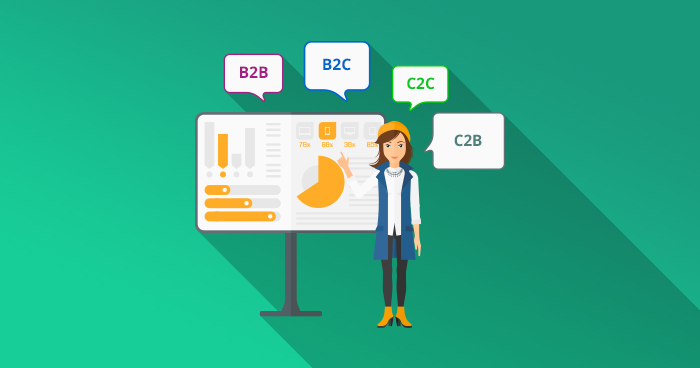Did you know that ecommerces sales are expected to grow by 10%+ in 2023, and experts estimate total global ecommerce sales will exceed $6 trillion by the end of the year? This kind of revenue and exposure are difficult to ignore and there has never been a better time for your business to start selling online.
If you are contemplating this and want to make a shift to an ecommerce business, there are some basic elements you must understand beforehand. One of the simplest but most important details is the types of ecommerce businesses and ecommerce business models and I explain these below.
Understanding eCommerce Business Models
Ecommerce can be categorized into four different business models and these relate to the relationship between buyer and seller. The two potential involved parties are the business and consumer and we can see the four models below:
- B2B – Business to Business
- B2C – Business to Consumer
- C2C – Consumer to Consumer
- C2B – Consumer to Business
Business to Business
B2B is when a company is selling to another business, and not to the end consumer. Examples of B2B include food manufacturers selling products to supermarkets, and raw material companies selling items to car manufacturers.
Business to Consumer
B2C is when a company sells directly to the end consumer. There are hundreds of examples of B2C and you probably use them daily such as supermarkets, car retailers, online sports stores, and clothes retailers.
Consumer to Consumer
C2C is where the end customer is selling something to another customer. These are things like social media marketplaces and eBay where the ecommerce platform is merely a facilitator between the two consumers.
Consumer to Business
Lastly, we have a newer brand of ecommerce model in C2B and this is where a consumer is delivering value to a business. Examples include referral programs, affiliate websites, paid testimonials, and data sharing.
Specific Types of Ecommerce Businesses
With the above information, we can go one step further and define four different types of e-commerce business and you probably have experience with each one at some point:
1. Affiliate Websites
Affiliate websites are incredibly popular and can generate consistent income without the need to actually produce or sell your own products.
The premise of an affiliate site is simple – a business provides a unique affiliate link to the affiliate site, and the company puts this link on its website. When a customer visits their website, clicks the link, and makes a positive action like making a purchase via the link, the affiliate website gets a commission.
These terms are pre-determined as part of the affiliate program such as commission percentages and advertising guidelines.
Amazon affiliate websites are perhaps the most common variant and it is a mutually beneficial partnership. The affiliate website just has to have excellent SEO to drive traffic and in return, they get income from affiliate sales. The company giving the affiliate links benefits from increased sales, but also someone else marketing their products for them!
2. Single Brand Websites
Single-brand websites are currently the most common ecommerce platform and something that an ecommerce SEO consultant can help build and optimize.
This is a website from a single business that sells its products or services. A great example is the Nike online store. If you visit the Nike online store you can only find sports gear, clothing, and equipment from Nike.
Single-brand websites can fall under different ecommerce business models though and they are not exclusively B2C. The main point is that you can only find products or services from one brand on that website.
The main advantage of a single-brand website is that you have complete control over every aspect including site design, prices, marketing, and personalization. You don’t have to report to any third parties, nor are your profits watered down.
3. Online Retailers
Online retailers are incredibly popular and you have probably used at least one at some point! I use one every week to order my groceries! Yes – online supermarkets and superstores like Walmart and Tesco are prime examples of online retailers.
These are usually larger ecommerce platforms that sell a wide variety of third-party products from other manufacturers and usually some home-brand items too.
Online sports retailers are a great example too – platforms like Sports Direct have hundreds of items from different manufacturers like tennis racquets, sports clothing, and sneakers that they merely sell on the manufacturer’s behalf.
The manufacturer benefits from the reputation, exposure, and huge customer base the online retailer has, while the retailer benefits from being able to sell an incredibly diverse range of products without the associated costs.
4. Marketplaces
Lastly, we have the ecommerce marketplace. I can guarantee that you have probably used at least one of these three marketplaces in your lifetime – eBay, Amazon, and Etsy.
Marketplaces act as the middleman between buyer and seller and take a little commission for providing the central meeting place!
Consider Amazon – I bought some racquet tape for my badminton racquet this week. Although I bought it on Amazon, I actually bought it from a third-party company simply advertising their products on the platform and they took care of the shipping.
Marketplaces like Amazon and eBay can fall under different ecommerce models too. In fact, eBay for example can be considered both B2C and C2C as you have a mix of people selling to people, and businesses selling to people!
Understand Your eCommerce Website Model for Better Success
I hope you now have a clear understanding of the different types of ecommerce businesses and their business models. It’s imperative to know which category your business fits into so that you can tailor your website and appeal to the correct audience.
Before even contemplating website design, SEO, and marketing, asses your company and leave no doubts as to which ecommerce model you should follow.










